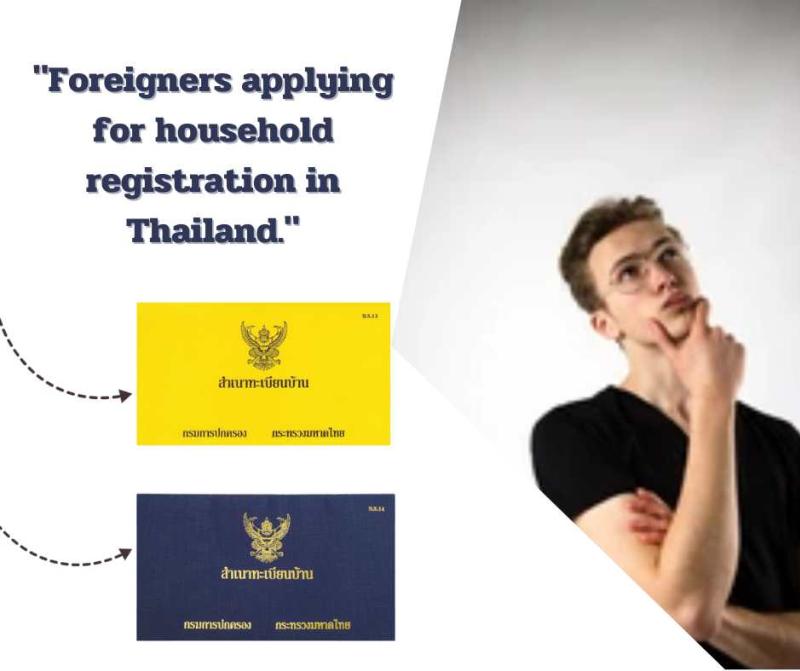
Created : 17 Nov 2023
Foreigners applying for household registration in Thailand are required to submit certain documents.
The household registration is a document that includes a household code, a list of all individuals residing in the household, and indicates who the head of the household is and who the residents are. The household registration provides detailed information for each individual, such as their full name, parents' names, national identification number, date of birth, and other relevant details.
For foreigners residing in Thailand, having a household registration can facilitate various transactions, including obtaining a driver's license, opening a bank account, and many other transactions. For foreigners who wish to be registered in the Thai household registry, such as in the case of marriage registration or when purchasing real estate and wanting to be the registered owner, certain documents are required.
When foreigners apply for household registration in Thailand, they are not eligible to be registered as the head of the household (เจ้าบ้าน), but they can apply to be registered as residents (ผู้อยู่อาศัย) only. For the registration of foreigners, the document required is the Yellow House Registration Book (ทะเบียนบ้านเล่มเหลือง or ทร.13). This book specifically serves the purpose of recording the details of foreign residents in Thailand. Please note that the Yellow House Registration Book is used to document the residence information of foreigners and is distinct from the regular blue House Registration Book used for Thai citizens.
There are two types of household registration books available:
1. Blue House Registration Book (ท.ร.14): This book, in blue color, is for individuals with Thai nationality.
2. Yellow House Registration Book (ท.ร.13): This book, in yellow color, is specifically for foreigners.
The household registration is a document that specifies who the head of the household is and who the residents are in a particular residence. This is in accordance with the Registration Act, and individuals can request to be registered by submitting an application at the district or municipal registration office. In Bangkok, this process is carried out at the district office. While the cost of obtaining a household registration is relatively affordable, the processing time may vary. The Registration Act governs the procedures for applying for and maintaining household registration in Thailand.
Registering for the Yellow House Registration Book (ท.ร.13) is intended for foreign individuals who enter the country legally but are in a temporary status. The specific rules and requirements for registration can vary between districts, and each district office may have its own regulations.
Documentation required for registration typically includes personal identification documents and photographs. For instance, some district registration offices may request a certificate from the embassy confirming the individual's residence in Thailand, while others may not.
Preparing documents for a foreigner marrying a Thai national involves attention to the following details:
1. Original Passport
2. Copy of Passport Certified by the Embassy and Translated into Thai, Certified by the Thai Consular
3. Work Permit in Thailand (if working in Thailand)
4. Marriage Certificate
5. Birth Certificate of the Child (if applicable)
6. Two Passport-sized Photos (1.5 inches)
7. Original National ID card of the Thai Spouse
8. Original National ID card of the Foreign Spouse
9. Original Household Registration Book of the Thai Spouse
10. Copy of Household Registration Book (prepare as a backup)
11. Two Witnesses with their National ID Cards (should be individuals who know the couple)
The Thai spouses must have their names registered in the same household registration.
Preparing documents for the case where a foreigner purchases real estate and wishes to have their name registered as the property owner:
1. Passport:
Copy of the foreigner's passport.
2. Visa and Work Permit (if applicable):
Copy of the visa and work permit (if the foreigner is employed in Thailand).
3. Title Deed (Chanote):
Original or copy of the title deed (Chanote) of the property.
4. Sales Agreement:
Copy of the sales agreement for the property.
5. Receipt of Payment:
Proof of payment for the property.
6. Certificate of Residence (if required):
Some districts may require a certificate of residence for the foreigner. Check with the local registration office.
7. Power of Attorney (if using a representative):
If someone else is representing the foreigner in the transaction, a power of attorney may be required.
8. Translation of Documents:
Translations of relevant documents into Thai, certified by a licensed translator.
9. Land Department Forms:
Any forms required by the Land Department for the property registration process.
"Submit all documents to the district office or the district chief's office for verification. An official will review the documents and schedule an interview. The interview will be conducted in the Thai language. If a foreigner is unable to communicate in Thai, they must bring an interpreter."
This information outlines the process of submitting documents for verification, scheduling an interview, and the language requirements for the interview, emphasizing the need for an interpreter if the foreigner cannot communicate in Thai.

